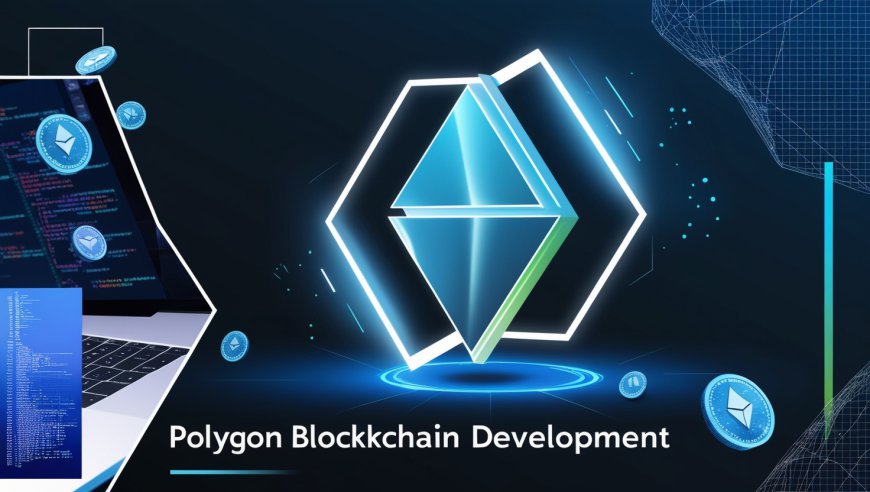Polygon Blockchain Development: A Revolutionary Approach to Scaling Ethereum

In the ever-evolving world of blockchain technology, scalability remains one of the biggest challenges. Ethereum, the most popular blockchain platform for decentralized applications (dApps), has struggled with slow transaction speeds and high fees, especially as its user base continues to grow. Polygon, originally known as Matic Network, has emerged as a robust solution to these scalability issues, offering a Layer 2 scaling solution for Ethereum. Through the Polygon blockchain development, it is now possible to enhance Ethereum’s performance while maintaining its security and decentralization principles.
What is Polygon Blockchain?
Polygon is a decentralized platform that provides scalable, secure, and instant blockchain transactions using Ethereum’s existing infrastructure. It is a Layer 2 scaling solution designed to work on top of Ethereum, offering a multi-chain network of blockchains. Polygon allows developers to build decentralized applications (dApps) with high throughput and low-cost transactions, while ensuring compatibility with Ethereum.
Polygon’s primary objective is to improve the scalability of Ethereum without compromising its decentralized nature. It is a framework that connects various Ethereum-compatible blockchain networks, and it enables developers to build their own blockchain projects and applications on top of Ethereum with ease.
Key Features of Polygon Blockchain Development
-
Scalability
One of the core features of Polygon is its scalability. Through the use of sidechains and Layer 2 solutions, it can process thousands of transactions per second (TPS). Unlike Ethereum, which has a limit of 15–30 TPS, Polygon offers significantly higher throughput. This makes it ideal for dApps that require fast and efficient transaction processing without burdening the Ethereum network. -
Low Transaction Fees
Ethereum’s high gas fees have been a major roadblock for decentralized finance (DeFi) and other dApp use cases. Polygon solves this problem by providing low-cost transactions. The network’s use of sidechains allows it to process transactions at a fraction of the cost, making it an attractive solution for developers looking to create affordable decentralized applications. -
Ethereum Compatibility
Polygon is fully compatible with Ethereum’s infrastructure, allowing developers to build applications using existing Ethereum tools, such as smart contracts and decentralized storage systems. This compatibility ensures that developers can easily migrate their Ethereum-based projects to Polygon or even deploy applications on both networks simultaneously. -
Security
Security is a primary concern in blockchain development, and Polygon edge this by offering a secure framework. Polygon’s Proof of Stake (PoS) consensus mechanism ensures that the network is safe from attacks, and its security model relies on Ethereum’s consensus model for added protection. -
Interoperability
One of the standout features of Polygon is its ability to connect different Ethereum-compatible blockchains. This interoperability allows developers to create decentralized applications that can interact seamlessly with other networks, reducing barriers between various blockchain ecosystems. As a result, users can engage in cross-chain transactions and share assets across different platforms.
Benefits of Polygon Blockchain Development
-
Enhanced User Experience
By addressing issues like transaction latency and high fees, Polygon provides a smoother user experience for dApp users. Faster transaction speeds and reduced costs make the network more accessible and usable for both developers and end-users. This is crucial for the growth of decentralized applications and the broader blockchain ecosystem. -
Improved Performance for dApps
Decentralized applications, particularly those in the DeFi space, require a high level of performance to function effectively. Polygon’s scalability and speed ensure that these applications can run efficiently, even as user demand increases. Developers can create dApps that can handle a larger volume of users and transactions without compromising performance. -
Developer-Friendly Ecosystem
Polygon offers a wide range of tools and resources for developers. Its compatibility with Ethereum’s smart contracts and infrastructure means that developers can easily port their existing projects to Polygon without needing to relearn new programming languages or tools. Polygon also provides an SDK (Software Development Kit) for building custom blockchains, making it a versatile platform for various use cases. -
Community Support and Adoption
Polygon has experienced widespread adoption within the blockchain community. With a large number of projects already utilizing its infrastructure, including top-tier dApps in DeFi, NFTs, and gaming, Polygon has cemented its position as a leading blockchain scaling solution. The active developer community further ensures that Polygon continues to evolve and improve.
Polygon Blockchain Use Cases
Polygon blockchain capabilities are being leveraged in a wide range of industries. Some of the most notable use cases include:
-
Decentralized Finance (DeFi): Many DeFi projects have migrated to Polygon to take advantage of its low transaction fees and high throughput.
-
Non-Fungible Tokens (NFTs): Polygon’s fast transactions and low fees have made it a popular choice for NFT projects, where users can mint, buy, and sell digital assets without breaking the bank.
-
Gaming: Polygon offers the scalability needed for blockchain-based games, where in-game transactions and assets require fast processing.
-
Supply Chain Management: Blockchain’s transparency and immutability make it ideal for supply chain applications, and Polygon’s performance features help ensure these applications run efficiently.
Conclusion
Polygon has proven to be a transformative force in blockchain development, providing solutions to some of Ethereum’s most pressing challenges. Its scalability, low fees, security, and compatibility with Ethereum make it an appealing platform for developers looking to build decentralized applications. As the blockchain ecosystem continues to grow, Polygon’s role in enhancing Ethereum’s capabilities is expected to play a significant part in shaping the future of blockchain technology.
For developers, Polygon offers a unique opportunity to create high-performance dApps that can scale effectively while benefiting from the security and decentralized nature of Ethereum. The Polygon blockchain is undoubtedly a key player in the blockchain revolution, and its adoption is likely to expand as more projects seek to leverage its advantages.
